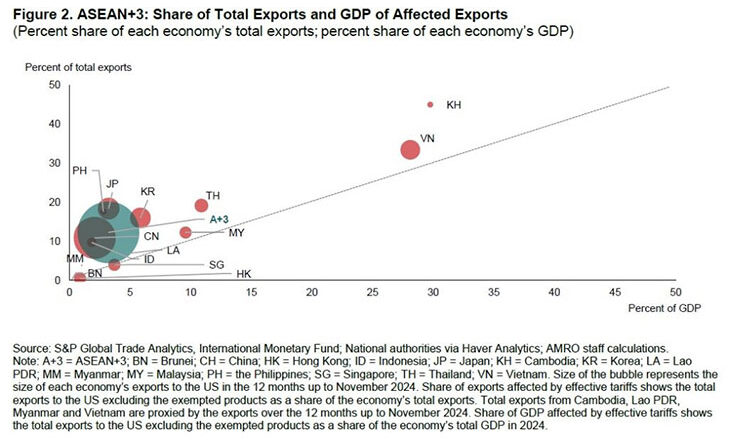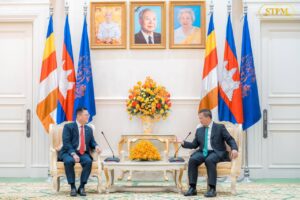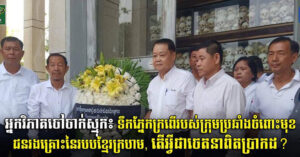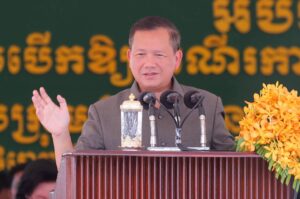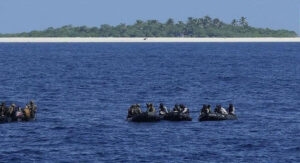Opinion: ASEAN must unite as it navigates global turbulence
Khmer Times | As foreign ministers and high-ranking diplomats from across Southeast Asia and beyond gathered in Kuala Lumpur this week, the message emerging from the ASEAN Ministerial Meetings was clear: ASEAN must deepen its unity, accelerate economic integration, and fortify its strategic relevance and agency in an increasingly uncertain and fragmented multipolar world.
The meetings, held from July 8-11 at the Kuala Lumpur Convention Centre, brought together around 1,500 delegates, including all ASEAN foreign ministers – with the notable exception of Myanmar, which was represented at a lower level. Timor-Leste, ASEAN’s soon-to-be 11th member, participated as an observer, marking a symbolic step towards the group’s long-anticipated enlargement.
Timor-Leste’s ASEAN entry: A historic moment in the making
A key highlight was the reaffirmation of Timor-Leste’s membership, set for formalisation at the 47th ASEAN Summit in October. With just 1.3 million people and a long history of struggle for independence, Timor-Leste’s accession represents not only the fulfilment of its decade-long aspiration but also ASEAN’s commitment to inclusivity and regional solidarity.
Cambodia has been a strong proponent of Timor-Leste’s entry, reflecting the group’s spirit of unity. Singapore, meanwhile, has supported Timor-Leste’s institutional preparedness through the ASEAN Readiness Support package and the Singapore Cooperation Programme, which has already trained about 800 Timorese officials.
Deepening economic integration amid global headwinds
Beyond enlargement, the meetings placed significant emphasis on ASEAN’s economic resilience and integration. The upgrading of the ASEAN Trade in Goods Agreement (ATIGA) and the ongoing development of the Digital Economy Framework Agreement (DEFA) are two strategic pillars of this push.
The upgraded ATIGA will strengthen intra-regional trade by reducing barriers and streamlining customs procedures, while DEFA aims to position ASEAN as a global hub for digital trade and services. With the region’s digital economy projected to double in value to US$2 trillion by 2030, the adoption of DEFA underscores ASEAN’s forward-looking strategy to harness the digital revolution for long-term growth.
However, ASEAN’s aspirations are being tested by rising economic protectionism and the weaponisation of trade. The US’s imposition of hefty tariffs on Southeast Asian exports continues to reverberate, casting a shadow over global trade stability. As Malaysian Prime Minister Anwar Ibrahim astutely noted, tariffs, export restrictions, and investment barriers have become “the sharpened instruments of geopolitical rivalry,” exacerbating the already fragile multilaterall trading system.
Anwar’s call for ASEAN to “trade more among ourselves, invest more in one another, and advance integration across sectors with resolve” is not just timely – it is essential. As global supply chains become increasingly politicised, ASEAN must double down on intra-regional trade and investment to shield itself from external shocks.
The ASEAN Power Grid initiative – another key topic in Kuala Lumpur – demonstrates the group’s commitment to sustainable development and energy security. By accelerating the region’s transition to clean energy and strengthening cross-border electricity connectivity, ASEAN is laying the groundwork for long-term resilience and decarbonisation.
Regional security flashpoints
Security concerns remain high on the agenda. ASEAN ministers reiterated their commitment to promoting a Southeast Asia free of nuclear weapons, addressing the ongoing conflict in Myanmar, and advancing the long-delayed Code of Conduct in the South China Sea. These unresolved issues continue to challenge ASEAN’s cohesion and credibility, particularly when external powers exploit internal divisions.
The Myanmar crisis, in particular, remains ASEAN’s test of unity. While Myanmar’s representation at a lower level reflects the group’s Five-Point Consensus and its non-recognition of the military junta’s legitimacy, concrete progress on peace and dialogue has been minimal. This internal challenge underscores the need for ASEAN to reinforce its collective diplomatic leverage and ensure that Myanmar is back on track in terms of peace and stability.
The simmering border tensions between Cambodia and Thailand risk becoming another security flashpoint in Southeast Asia if confidence-building measures and preventive diplomacy fail. To avert future armed confrontations, Cambodia has brought the dispute over four highly contested areas—Ta Mone Thom, Ta Mone Touch, Ta Krabey, and the Mom Bei area—to the International Court of Justice for legal settlement.
ASEAN centrality in a shifting global order
The meetings also reaffirmed ASEAN’s commitment to upholding an open, inclusive, and rules-based regional architecture. As great power rivalries intensify – especially between the United States and China – ASEAN’s strategic positioning as a neutral, convening platform becomes even more critical. ASEAN needs to maintain a strategic equilibrium.
To remain central and relevant, ASEAN must strengthen coherence across its three pillars – political-security, economic, and socio-cultural – while enhancing its partnerships with external powers in a manner that is “ASEAN-driven, strategic, and mutually beneficial.” This requires not only diplomatic finesse but also institutional reforms to optimise ASEAN’s mechanisms, resources, and decision-making processes.
Resilience and relevance
ASEAN stands at a crossroads. ASEAN needs to be more innovative and transformative to enhance its resilience and relevance. Defending the rules-based international order is a matter of survival.
ASEAN might need to develop a comprehensive regional policy framework on economic security to mitigate the risks stemming from the collapse of a rules-based multilateral trading system, the weaponisation of economic tools and dependencies, and intensifying geopolitical and geoeconomic competition.
The path forward demands that ASEAN is able to transform external pressures and challenges into opportunities for deeper integration, greater solidarity, and stronger collective action. ASEAN must have one voice on various global agenda including a united stand on tariff negotiations with the US.
ASEAN’s relevance in the evolving global order will hinge on its ability to act decisively, speak with one voice, and prioritise common regional interests over short-term national interests.
Chheang Vannarith is Chairman of National Assembly Advisory Council. The views expressed here are his own.

